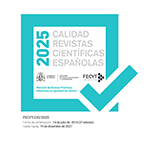The Ideological Discourse of Charlotte Brontë in 'Shirley'
Abstract
This paper analyses the linguistic changes arising from the formation of workers’ culture during the Industrial Revolution, as well as the effects of the pastoral work of the Anglican church, and its reflection on the Victorian literature produced by Charlotte Brontë. Specifically, this analysis is based on the parallelism established by this novelist between the values that lie behind the concepts of unionism and solidarity and her fight against the social conventions concerning marriage, as reflected in the novel Shirley. In fact, the human values that derive from these concepts were an inspiration that Brontë uses to provide cohesion and coherence to the plot of the novel within a narrative framework in which she minimizes the class difference between two young women: Caroline and Shirley. Brontë thereby shows that this class difference is not an obstacle for both women to share and feel the positive effects of these values within a social context dominated by social conventions regarding marriage.
Key Words: democracy, culture, Luddites, unionism and solidarity.
Downloads
Article download
License
In order to support the global exchange of knowledge, the journal Complutense Journal of English Studies is allowing unrestricted access to its content as from its publication in this electronic edition, and as such it is an open-access journal. The originals published in this journal are the property of the Complutense University of Madrid and any reproduction thereof in full or in part must cite the source. All content is distributed under a Creative Commons Attribution 4.0 use and distribution licence (CC BY 4.0). This circumstance must be expressly stated in these terms where necessary. You can view the summary and the complete legal text of the licence.









